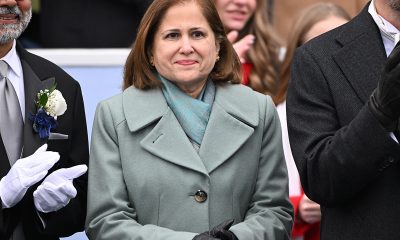Arts & Entertainment
In diverse slate of winners, Oscar is the biggest loser
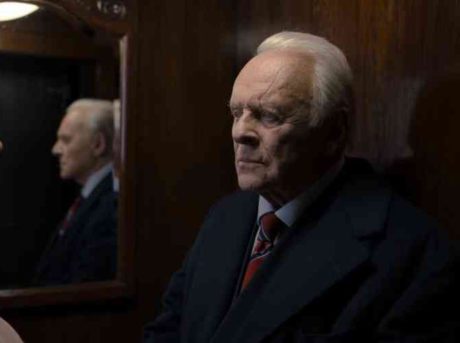
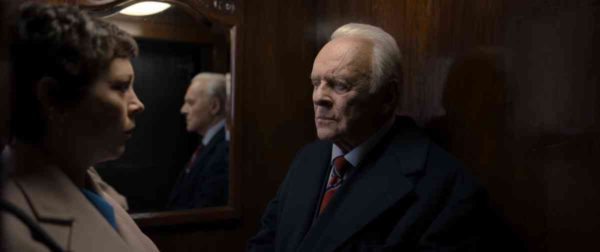
Best Actor winner Anthony Hopkins (center) with co-star Olivia Colman in “The Father” (image courtesy Sony Pictures Classics)
We knew the Academy Awards were going to be different this year.
Forced by Covid to reimagine its traditional presentation format, the movie industry’s most prestigious awards show convened not at Hollywood’s Dolby Theatre — at least, not for most of it — and opted instead to broadcast the ceremony from the relative intimacy of Los Angeles’ historic Union Station, where a small audience of nominees, presenters and guests gathered under “live set” safety protocols while other participants connected from various remote hook-ups across the world. Instead of auditorium seating, tables; instead of an orchestra, Questlove. In addition, show producers Steven Soderbergh, Jesse Collins, and Stacy Sher chose to shoot the event cinematically, employing the tricks and techniques of film to transform the evening from the stodgy affair so many of us love to hate into something resembling a movie. As promised during the week ahead of the broadcast, the show was going to tell a “story.”
It was a gamble that didn’t pay off.
Things started out promisingly enough, it must be said, with an opening tracking shot that followed host Regina King from the bright L.A. sunshine into the cool darkness of Union Station. The motion, the music, and most of all King’s commanding presence, gave us the sense that something big was about to happen. Then, early in her opening comments to the audience, King brought substance to the weight by commenting that “if things had gone differently in Minneapolis this week, I might’ve traded in my heels for marching boots” — reminding us (as if it were needed) of the national focus on Black justice that hung alongside Oscar’s long-lamented struggle with diversity like a shadow over the evening. The central theme of this Oscar “movie,” it seemed, had been firmly established.
For awhile, it seemed to be working. The evening’s first winners were Emerald Fennell for Best Original Screenplay, for “Promising Young Woman,” and Florian Zeller for Best Adapted Screenplay, for “The Father,” appearing to set a tone for the ceremony in which recognition would be spread around to all — something very much in tune with the presumed subplot of the “story” we were being told, in which Oscar would redeem itself from the #OscarsSoWhite associations of its past and prove itself to be a champion for fair and equal diversity, after all.
Soon after, Daniel Kaluuya took the award for Best Supporting Actor – no surprise there, as his performance as slain Black Panther leader Fred Hampton in “Judas and the Black Messiah” had won the equivalent prize from every other major film awards so far — firmly establishing the “redemption” theme by celebrating the powerful work of a Black actor in a true-life story that addressed the corruption and tragedy of systemic racism in America. A pair of awards for “Ma Rainey’s Black Bottom” (Best Makeup and Styling, Best Costume Design), as well as a win for the police-violence-themed “Two Distant Strangers” as Best Live-Action Short, reinforced it even further. Better still, a shout-out to trans acceptance from “Ma Rainey” stylist Mia Neal in her speech, and a plea from “Strangers” writer/director Travon Free for audiences not to be “indifferent to our pain” in his, lent a powerful sense of earnestness that made the whole thing feel authentic. Maybe this year, Oscar was finally getting it right.
Unfortunately, the Oscar “story,” in its effort to be inclusive, allowed all the winners to talk until they were done. In other words, Questlove did not start playing anyone off when they had used up their time, and the ambitious “movie” of the Oscars soon began lose any momentum it had built. This is not to say that the winners don’t deserve their time in the spotlight, or that some of the things that were said were not worthy of being heard; but anyone in show business should know the importance of keeping your audience interested, and the Academy Awards have such a long history of running ponderously overtime that it seems some kind of middle ground might have been reached.
There were other familiar complaints, too. The annual “in memoriam” segment inevitably left out some important names (Ann Reinking, Jessica Walter, “Glee” star Naya Rivera, and former Oscar nominee songwriter Adam Schlesinger, to name just a few), and there was an awkward segment in which Questlove played “Oscar trivia” with audience members, who were asked to identify movie songs that did NOT win the Academy Award. The latter situation was almost saved by nominee Glenn Close, who did an “impromptu” rendition of “Da Butt” that was as goofily charming as it was obviously pre-planned.
As the show wore on, the cinematic conceit chosen to revitalize the proceedings became mostly irrelevant in the face of Oscar’s usual baggage. Further, the absence of any performances of the year’s nominated songs, typically a favorite feature of fans at home, meant there was little respite from the dullness, which was made all the more apparent by the increasingly bored faces of the onscreen audience. The omission may have been due to the difficult logistics of additional Covid protocols, but surely pre-taped performances might have helped to perk things up. For the record, Best Original Song went to “Fight For You,” from “Judas and the Black Messiah.”
Along the way, there were noteworthy wins. The much-loved Pixar-Disney film “Soul” took the award for Best Animated Feature, as well as winning Best Original Score for composers Trent Reznor, Atticus Ross, and Jon Batiste; the virally popular “My Octopus Teacher” won for Best Documentary Feature; David Fincher’s black-and-white old-Hollywood homage “Mank” took the prizes for Best Production Design and Best Cinematography, continuing the trend of spreading out the wealth among the front-running contenders; in presenting Best Film Editing to “The Sound of Metal,” still-hunky Hollywood curmudgeon Harrison Ford gave an amusing nod to “Blade Runner,” the revered 1982 sci-fi film in which he starred, by reading the scathingly negative studio notes from a pre-release screening; and Best Supporting Actress went to veteran performer Yuh-Jung Youn for her work in “Minari,” making her only the second woman of Asian heritage to win the award (the first was Miyoshi Umeki for 1957’s “Sayanora”) — and making Close, who was nominated for her role in “Hillbilly Elegy,” tied with Peter O’Toole as the actor with the most nods without a single win.
By the time we reached the presentation of the four top prizes, there was little left of whatever enthusiasm had been drummed up by the opening segment of the show. Chloe Zhao’s expected win as Best Director, for “Nomadland,” making her the first Asian-American woman (and only the second woman, period) to receive the award, was an appreciated high point for her enthusiastic gratitude alone, but at this point, things had become pretty much business as usual, despite the grand designs and cinematic flourishes of the producers.
Then, the big twist came. Best Picture, always the final award of the evening, was being announced before the Lead Acting awards. What was happening? Was the Oscar “movie” about to give us a surprise ending?
The winner, “Nomadland,” had been favored, and star Frances McDormand helped to make the moment a highlight with a “wolf” howl (dedicated to sound mixer Michael “Wolf” Snyder, who passed away last month) when she joined the film’s other producers at the podium, but surely neither of those things warranted switching the order. Perhaps a clue to what was really happening could be found in the choice of presenter – Hollywood icon Rita Moreno, still fabulous at 89, whose Best Supporting Actress win for 1961’s “West Side Story” happened to have made her the first Hispanic woman to win an Oscar. Was this reminder of diversity from the Academy’s past a sign that the “redemption” theme was about to pay off?
It suddenly became obvious. The Oscar “movie” was leading up to an emotional finale, a big and uplifting triumph that would not only be a celebration of diversity, but a tribute to a gifted young man whose talents had been taken away from us too soon. The story of Oscar’s redemption would culminate in the posthumous awarding of the Best Actor prize to Chadwick Boseman, whose nominated performance in “Ma Rainey’s Black Bottom” was the last work he completed before losing his private battle with colon cancer and passing away at 43 last August. That would definitely be a “wow” finish.
Best Actress came first, accompanied by some suspense due to being one of the few categories without a clear front-runner. McDormand took the statue for “Nomadland,” joining a small handful of other performers as a three-time-winner and preventing “Ma Rainey” star Viola Davis from becoming the first Black actress to win twice. Her speech was refreshingly short and humble, a tribute to the joy of “the work” which included a quote from Shakespeare’s “Macbeth” (“My voice is in my sword”) – a play considered by actors worldwide to be “cursed,” which in retrospect casts an interesting light on what happened next.
To present the final award, last year’s Best Actor winner Joaquin Phoenix (looking exceptionally uncomfortable) came to the mike and, after a feeble joke about his reputation for method acting, read off the five nominees before opening the envelope to bring about the now much-anticipated denouement.
“And the Oscar goes to… Anthony Hopkins, ‘The Father.’”
It wasn’t quite “fade to black, roll credits” after that, but it might as well have been.
There was no uplifting finale, no redemption of the Academy as a reward for its show of diversity. There was only another in a long-running series of gaffes (remember the “La La Land” vs. “Moonlight” debacle from just a few years back?) that have made the Oscar show’s tendency to mess things up a running joke.
This one, however, was possibly the worst. In an arrogant attempt to shape a narrative out of real life events that hadn’t even happened yet, the Academy seems to have chosen to manipulate its audience into an emotional reaction — one that would have bolstered its own reputation and perhaps made up for some of its former perceived missteps — while exhibiting a cynical overconfidence in its own ability to predict the sentiments of its voters. As a result, its “wow” finish turned into an abrupt and uncomfortable faux pas, diminishing both Hopkins’ victory for a career-topping performance (which, at 83, makes him the oldest acting winner in Oscar history) and Boseman’s searingly powerful work by obscuring their accomplishments behind a colossal f*ck-up born of its own hubris.
It’s worth noting that a plan was (reportedly) in place in the supposedly “unlikely” event that Hopkins would win, in which “Father” co-star Colman – known for her disarming grace and humor in awards situations – would have accepted the award in his absence. As reported by The Guardian, Phoenix forgot to call her to the stage, resulting in the dull thud that was the end of the 93rd Academy Awards. Regardless, the Academy has only itself to blame. In its eagerness to tell the story it wanted to tell about itself, it appears to have forgotten that you have to know the ending first.
Ironically, when removed from all the drama, the list of winners does represent one of the most diverse and inclusive slates in Oscar history. It’s not enough, but it’s a start.
On that note, as a final observation, the LGBTQ community, despite recent strides in being acknowledged by Oscar, went largely unacknowledged at this year’s ceremony, with queer front-runners like “Two of Us” (a French contender for Best International Feature) and David France’s devastating “Welcome to Chechnya” (shortlisted for Best Documentary Feature) having been shut out of the nominations and no significant queer content among most of the nominated films. Apart from Neal’s aforementioned invocation of trans acceptance as part of a possible future in which the recognition of all women for their achievements would be “normal,” the only other time we came up was during Tyler Perry’s acceptance speech for the Jean Hersholt Humanitarian Award.
Perry, whose highly popular films are frequently criticized for embracing borderline homophobic and transphobic humor and perpetuating problematic tropes about gender and sexuality, gave a speech calling for people to “refuse to hate” anyone “because they are Mexican, or because they are Black or White, or LBGTQ” or “because they are a police officer” or “because they are Asian.” Apart from the conflation of being a police officer (a choice) with being an LGBTQ person or a person of color (not a choice), the fact that he mixed up the “B” and the “G” is a clear indicator that, while he may refuse to hate us, he’s not exactly a committed ally, either.
If the LGBTQ angle seems like a footnote to the story, that’s because it is. Once more, the queer community is left feeling like an uninvited guest by the Academy.
If Oscar wants its story to be about diversity, it’s clear that next year’s “story” needs some better writers.
Theater
‘Octet’ explores the depths of digital addiction
Habits not easily shaken in Studio Theatre chamber musical

‘Octet’
Through Feb. 26
Studio Theatre
1501 14th Street, N.W.
Tickets start at $55
Studiotheatre.org
David Malloy’s “Octet” delves deep into the depths of digital addiction.
Featuring a person ensemble, this extraordinary a capella chamber musical explores the lives of recovering internet addicts whose lives have been devastated by digital dependency; sharing what’s happened and how things have changed.
Dressed in casual street clothes, the “Friends of Saul” trickle into a church all-purpose room, check their cell phones in a basket, put away the bingo tables, and arrange folding chairs into a circle. Some may stop by a side table offering cookies, tea, and coffee before taking a seat.
The show opens with “The Forest,” a haunting hymn harking back to the good old days of an analog existence before glowing screens, incessant pings and texts.
“The forest was beautiful/ My head was clean and clear/Alone without fear/ The forest was safe/ I danced like a beautiful fool / One time some time.”
Mimicking an actual step meeting, there’s a preamble. And then the honest sharing begins, complete with accounts of sober time and slips.
Eager to share, Jessica (Chelsea Williams) painfully recalls being cancelled after the video of her public meltdown went viral. Henry (Angelo Harrington II) is a gay gamer with a Candy Crush problem. Toby (Adrian Joyce) a nihilist who needs to stay off the internet sings “So anyway/ I’m doing good/ Mostly/ Limiting my time/ Mostly.”
The group’s unseen founder Saul is absent, per usual.
In his stead Paula, a welcoming woman played with quiet compassion by Tracy Lynn Olivera, leads. She and her husband no longer connect. They bring screens to bed. In a love-lost ballad, she explains: “We don’t sleep well/ My husband I/ Our circadian rhythms corrupted/ By the sallow blue glow of a screen/ Sucking souls and melatonin/ All of my dreams have been stolen.”
After too much time spent arguing with strangers on the internet, Marvin, a brainy young father played by David Toshiro Crane, encounters the voice of a God.
Ed (Jimmy Kieffer) deals with a porn addiction. Karly (Ana Marcu) avoids dating apps, a compulsion compared to her mother’s addiction to slot machines.
Malloy, who not only wrote the music but also the smart lyrics, book, and inventive vocal arrangements, brilliantly joins isolation with live harmony. It’s really something.
And helmed by David Muse, “Octet” is a precisely, quietly, yet powerfully staged production, featuring a topnotch cast who (when not taking their moment in the spotlight) use their voices to make sounds and act as a sort of Greek chorus. Mostly on stage throughout all of the 100-minute one act, they demonstrate impressive stamina and concentration.
An immersive production, “Octet” invites audience members to feel a part of the meeting. Studio’s Shargai Theatre is configured, for the first, in the round. And like the characters, patrons must also unplug. Everyone is required to have their phones locked in a small pouch (that only ushers are able to open and close), so be prepared for a wee bit of separation anxiety.
At the end of the meeting, the group surrenders somnambulantly. They know they are powerless against internet addiction. But group newbie Velma (Amelia Aguilar) isn’t entirely convinced. She remembers the good tech times.
In a bittersweet moment, she shares of an online friendship with “a girl in Sainte Marie / Just like me.”
Habits aren’t easily shaken.
Sports
Blade, Pride House LA announce 2028 Olympics partnership
Media sponsorship to amplify stories of LGBTQ athletes
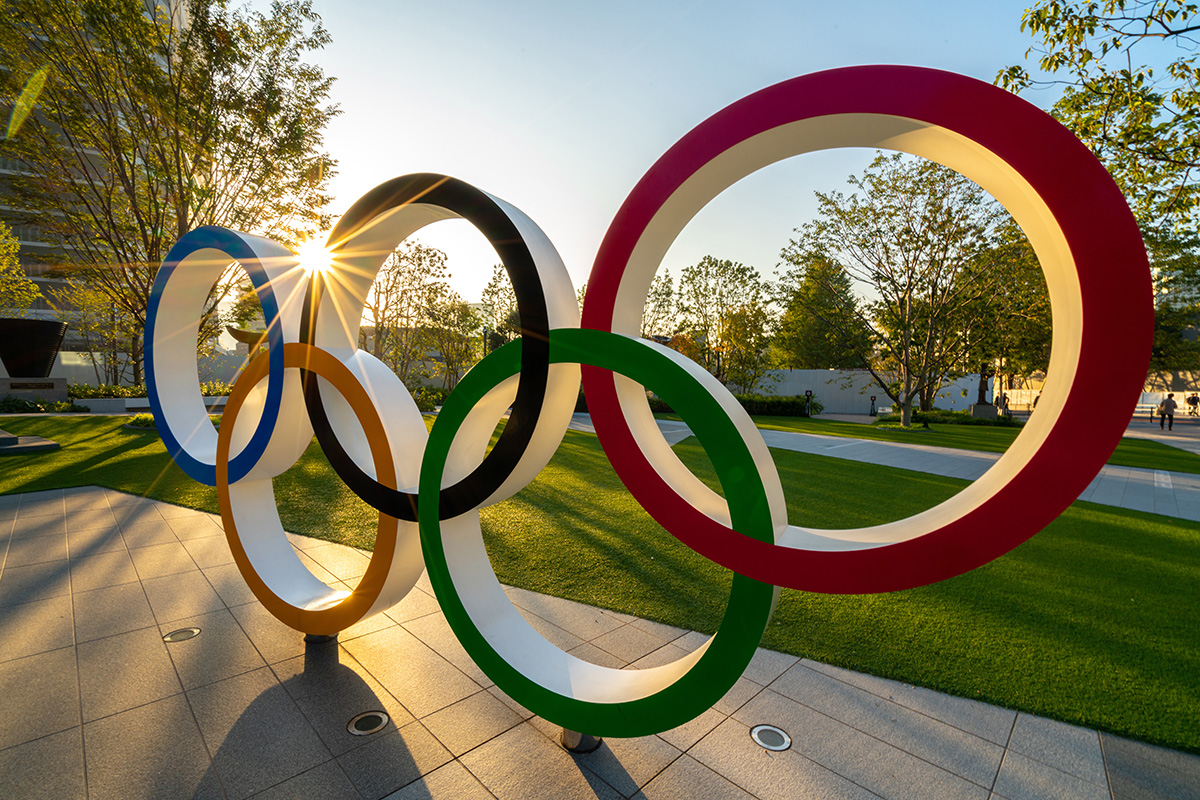
The Los Angeles Blade and Washington Blade on Friday announced a media partnership with the Out Athlete Fund, which will produce Pride House LA for the 2028 Summer Olympics.
Pride House is the home for LGBTQ fans and athletes that will become a destination during the L.A. Summer Games in West Hollywood in partnership with the City of WeHo. This 17-day celebration for LGBTQ athletes and fans will include medal ceremonies for out athletes, interactive installations, speakers, concerts, and more.
The Los Angeles Blade will serve as the exclusive L.A.-area queer media sponsor for Pride House LA and the Washington Blade will support the efforts and amplify coverage of the 2028 Games.
The Blade will provide exclusive coverage of Pride House plans, including interviews with queer athletes and more. The parties will share content and social media posts raising awareness of the Blade and Out Athlete Fund. The Blade will have media credentials and VIP access for related events.
“We are excited to partner with the Washington Blade, the oldest LGBTQ newspaper in the United States and the Los Angeles Blade, already a strong supporter of Out Athlete Fund and Pride House LA/West Hollywood,” said Michael Ferrera, CEO of Pride House LA. “Our mission is about increasing the visibility of LGBTQ+ athletes and fans to challenge the historical hostility toward our community in the sports world. Visibility is what publications like the Washington and Los Angeles publications are all about. We know they will play a key part in our success.”
“LGBTQ visibility has never been more important and we are thrilled to work with Out Athlete Fund and Pride House LA to tell the stories of queer athletes and ensure the 2028 Summer Games are inclusive and affirming for everyone,” said Blade Editor Kevin Naff.
Out Athlete Fund is a 501(c)3 designed to raise money to offset the training cost of out LGBTQ athletes in need of funding for training. The Washington Blade is the nation’s oldest LGBTQ news outlet; the Los Angeles Blade is its sister publication founded nine years ago.
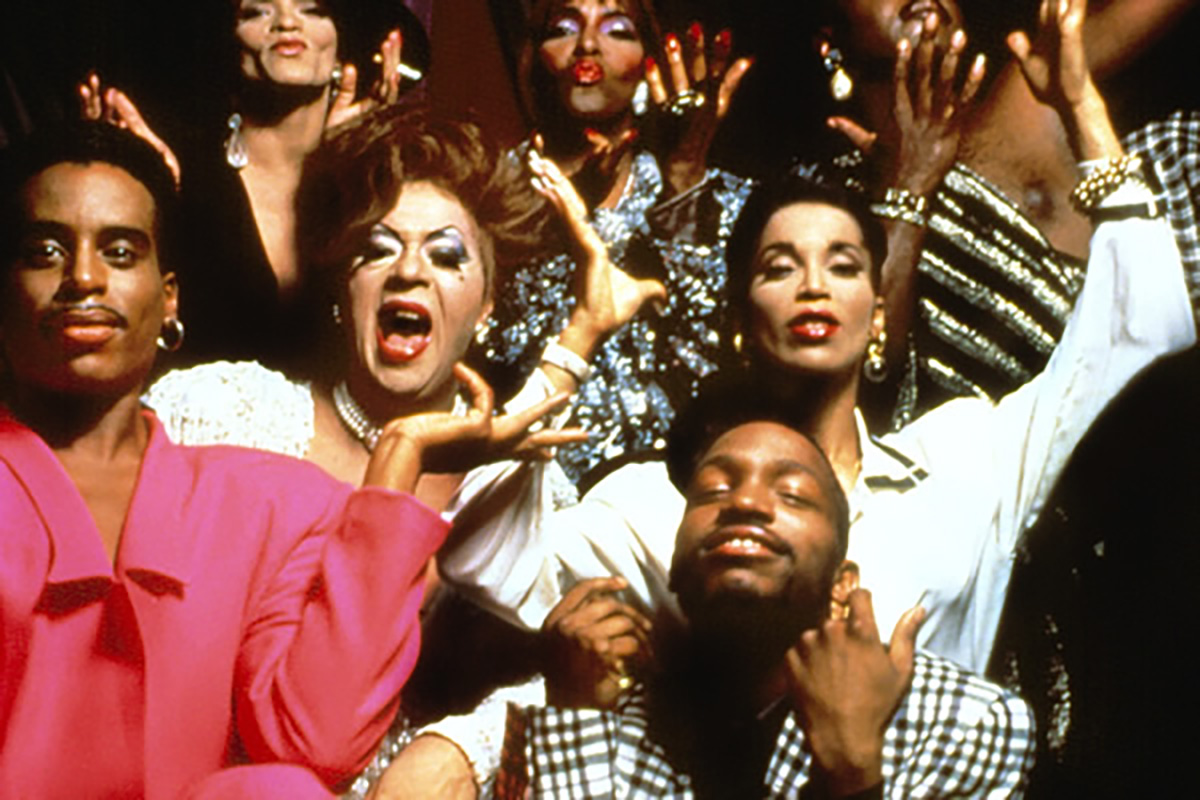
In honor of Black History Month, the DC LGBTQ+ Community Center will host a series of events uplifting the histories, artistry, and resilience of Black LGBTQ+ communities through dialogue, film, and intentional gathering.
The series begins with “Ballroom Culture: Rhythms of Resilience,” a panel discussion on Tuesday, Feb. 10, 2026 at 7 p.m. Artists, activists, and leaders from the ballroom community will explore ballroom’s historical, cultural, and political significance as a site of resistance, kinship, creative expression, and social justice within Black, Latinx, and LGBTQ+ communities.
On Friday, Feb. 13 at 12:30 p.m., the Center will host a screening of the groundbreaking documentary “Paris is Burning,” which chronicles New York City’s ballroom scene and house culture while examining themes of race, class, identity, and survival through the voices of legendary performers including Willi Ninja, Pepper LaBeija, and Dorian Corey.
The month will conclude with “Soul Centered: A Black LGBTQ+ Gathering” on Saturday, Feb. 21, 2026 at 3:30 p.m. This free, RSVP-required event invites Black LGBTQ+ community members into a space of rest, connection, and reflection centered on love in all its forms. The gathering will feature a panel conversation with Black LGBTQ+ creatives, healers, and community members, followed by intentional speed connections and a closing social mixer.
For more details and to RSVP, visit the Center’s website.
-

 Virginia4 days ago
Virginia4 days agoHashmi speaks at Equality Virginia Lobby Day
-

 District of Columbia4 days ago
District of Columbia4 days agoNorton hailed as champion of LGBTQ rights
-

 Maryland4 days ago
Maryland4 days ago4th Circuit dismisses lawsuit against Montgomery County schools’ pronoun policy
-

 District of Columbia3 days ago
District of Columbia3 days agoD.C. Council gives first approval to amended PrEP insurance bill

















